The Academy stands up for the scientific method – President László Lovász’s report
László Lovász, President of the Hungarian Academy of Sciences, spoke of the situation of science and the tasks of researchers in his speech delivered at the 189th General Assembly of MTA. The President of the Academy emphasised that answers to scientific questions that interest the general public can only be provided with scientific methods which conform to international standards. László Lovász’s report on mta.hu.
Dear Participants,
Let me first speak about a problem which concerns all scientists in many respects, but which is not dealt with in detail. This is
the responsibility of science and scientists.
There are three independent yet interconnected events that have urged me to focus on this issue.
- The European Code of Conduct for Research Integrity was published by ALLEA (ALL European Academies), which is also available in Hungarian. We are currently revising our own ethical code to ensure that it is fully harmonised with the new ALLEA code.
- We have prepared a preliminary statement of the General Assembly, which asks all members of MTA’s public body to actively and consistently spread the basic principles of science at all forums and in all kinds of media. The details are to be discussed later, but let me share the motto of the proposal with you: Science is power, do not abuse it!
- In 2018, Budapest is to host the 9th World Science Forum. We propose the following motto for the conference: The Responsibility of Science.
The responsibility of science is present in several fields; I will mention a few important ones here: spending money for research in a responsible and transparent manner, in the service of science; serving science while reviewing articles, books and tender documents, and working in committees both in Hungary and abroad; popularising science and preparing young people for a scientific career from their secondary school years. I could also add all those tasks that the researcher community has to conduct as part of their job in both Hungary and abroad, without any payment or minimal sum of money.
In exchange for all this, we would like to ask for more trust from society. Let me give you an example: the public procurement procedure. In my opinion, the public procurement procedure in Hungary is too strict, in general. It severely hinders scientific work. Departments and research groups have always provided an itemised breakdown of the strict research budget. Ever since the different scientific sources have needed to be combined at the university level, this controlling mechanism has been ruled out, opening the way for bureaucracy – which does not understand or tolerate the special position and needs of science, thus slowing work in an unacceptable way, resulting in controversial situations.
Let me note here that MTA and the Ministry of Human Capacities have put forward a joint proposal for a solution to this intolerable situation. Up to now, we have only had partial success: the Public Procurement Authority has favourably modified their collection of examples. But there is still a lot to be done in this field. Long-term solutions can only be arrived at if scientists are trusted more; with this, the researchers’ responsibility naturally increases.
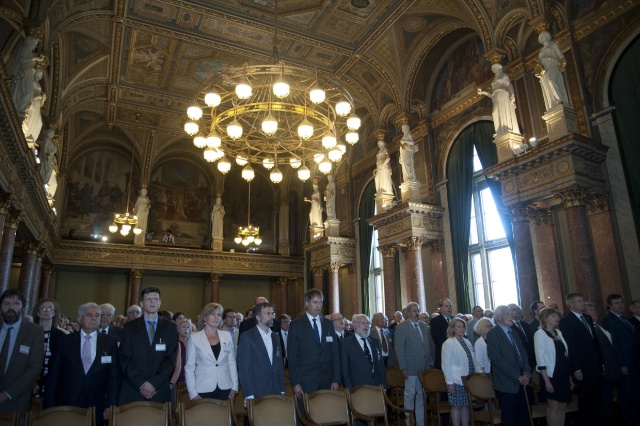 credit: mta.hu/Tamás Szigeti
credit: mta.hu/Tamás Szigeti I also consider it to be the manifestation of a lack of confidence in us that there are several administrative restrictions on the human resources of scientific institutes. Labour legislation does not include the special viewpoints of scientific research. To counterbalance the migration of scientists, it is not enough to launch programmes that attract Hungarian scientists home. We should also “circulate” scientists, that is, use foreign researchers, which is a global trend. At present, this process requires a tremendous amount of bureaucracy (registration of a degree, habilitation, getting the title of Doctor of the Academy). When I, the President of the Academy, am responsible for giving permission – based on the opinion of our Doctoral Council – regarding the skipping of the registration procedure of a young foreign scientist’s PhD degree for his or her one- or two-year-long employment, I think a lot. Do we really think that the head of an institute, who is responsible for several hundred researchers and has a budget of several billion forints at his or her disposal, is not capable of deciding whether a young foreigner’s previous scientific achievement entitles him or her to a few years of employment in the institute?
Let me discuss some issues connected to the researcher’s responsibility in detail.
Questions related to the ethics of research face scientists every day. If ethics are violated, trust is gone. We must apply the Code of Conduct for Research Integrity without compromises, and we must make everybody respect these requirements. The code lays down four basic principles: reliability in ensuring the quality of research; honesty in developing, undertaking, reviewing, reporting and communicating research; respect for colleagues, research participants, society, ecosystems, cultural heritage and the environment; and accountability for the research and for its wider impacts. These principles must be enforced without compromise. All this, and perhaps even more, is indispensable in ensuring that scientific research, including basic research, be regarded as an unquestionably useful activity by both society and politicians.
Scientific publications are going through a crisis. Scientists are obliged to publish their results at appropriate scientific forums in a given field. I believe we all agree on the importance of this. However, there are serious problems connected to this process. Leading publishing companies increase their profits shamelessly. It is not rare that we are obliged to pay them twice – first for publication, and then for reading. Open Access is to be mandatory from 2020, but it is not at all clear now how this is to be achieved and at what cost. I shall launch a debate at the Academy in autumn, taking the different traditions of scientific fields into consideration.
It must be acknowledged that the present crisis is caused by ourselves. When deciding about promotions or grants or the awarding of degrees, it is much easier for us to look at the impact factor or quartile of the journal publishing the applicant’s results than to look into the details of the applicant’s work. Thus it is very expensive to publish in prestigious journals, and authors do everything they can to be able to finance this. This situation will not change at once. However, it is important to ensure that reviewers should concentrate on the content instead of formal criteria, in line with the DORA declaration.
The fair communication and interpretation of scientific results is an important moral obligation for scientists. The Academy does not support specific scientific notions; it has no “scientific opinion” on scientific problems. The Academy stands up for scientific methods.
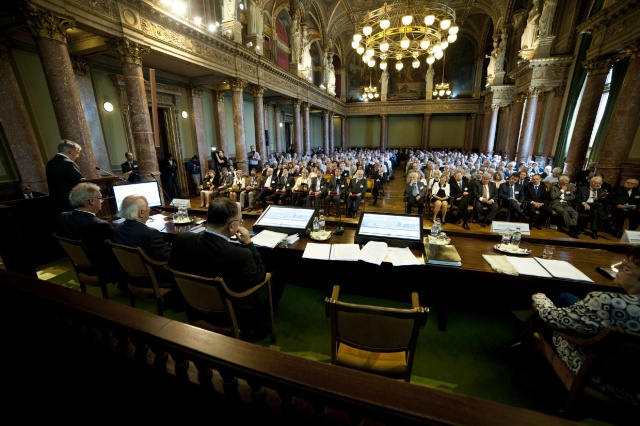 credit: mta.hu/Tamás Szigeti
credit: mta.hu/Tamás Szigeti We do not claim that plant extracts are ineffective – but we require that before advertising an extract as effective, it should pass the same strict tests as approved medicines. We do not claim that Hungarians are of Finno-Ugrian, Turkish or Sumerian origin – but we require that the questions concerning the prehistory of Hungarians should be asked in a scientific manner. The following questions have radically different meanings: “Which language family does Hungarian belong to?” “Where does Hungarian vocabulary come from?” Or “What genetic markers can be found in the present Hungarian population and in the population of the time of the Hungarian Conquest, and in what proportions?” And a fourth question is “What possible historical events and processes can be reconstructed from such data?” These questions must be answered in a scientific manner, meeting internationally recognised standards.
A test whose aim is to prove a pre-declared “truth” cannot be regarded as scientific research – should it concern a basic principle of Marx’s theorem, the soul of the Hungarian people or the advantages of a sponsor’s products Few researches have made science look so ridiculous as when British “scientists” carried out tests which proved that margarine was better for us than butter, only to prove the opposite the following year. An assessment of the possible effects of results are scientists’ moral obligation. Significant scientific or technical results might lead to long-term social changes. Several examples support this, from the emergence of agriculture to information technology. A number of innovations were or are still extremely dangerous. The best example of this is the atomic bomb, the dangers of which were soon recognised by engineers and scientists. However, there are other innovations whose dangers are not so self-evident. The second half of the 20th century saw the enormous impact of the spread of vaccinations, other achievements in medicine, and the “green revolution”. Could we think of a more noble cause than the saving of lives and feeding of the hungry millions? However, little has been said about how these important results led to the population explosion and how this problem should be dealt with. We have failed to provide information and better schooling and to employ women, among many things, all of which should have been done with the help of the developed world, maybe even by pressure or mild force. That is to say, we have not solved a problem, we have just postponed it by approximately forty years – while the problem has grown and is knocking on our door.
We are able to create new, long-term problems as well. Artificial intelligence has escaped its original room in information technology laboratories and is annexing new territories: let us think about self-driving cars, medical diagnostic tests or the increasingly successful realisation of virtual reality. This trend is promising, but it also has immense dangers – including job loss, the loss of our private spheres, the end of education and schooling, and other threats which we cannot foresee, including the removal of humanity. I could also mention the unforeseen effects of big data, genome technology and the information revolution.
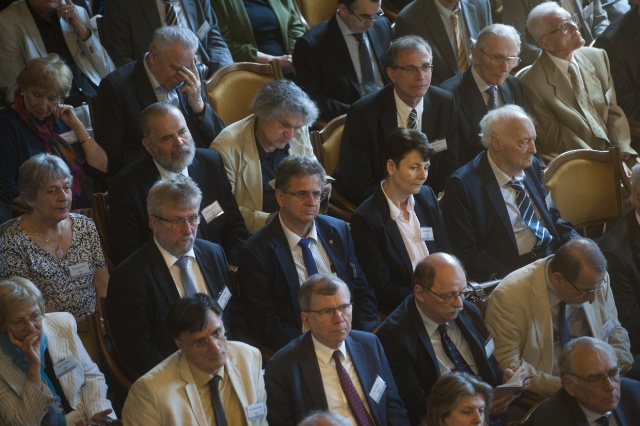 credit: mta.hu/Tamás Szigeti
credit: mta.hu/Tamás Szigeti Please, do not misunderstand what I am saying. I am not against artificial intelligence or leading research; in fact, we scientists must take the lead in ensuring that new innovations do not end up being controlled and used by the wrong hands. Researchers in the fields of natural, life or social sciences or the humanities should foresee and face the serious social, safety, and health problems which are arising. We should not realise in forty years that, although we had hoped that artificial intelligence would make our world nicer and better, in reality, the problems have come back in a different form, in a way more frightening than ever before.
After these introductory thoughts, let me highlight some themes from among our diverse range of activities and talk about our most important results and problems.
Our members
We are all looking forward to next year’s member elections. On Tuesday, the Academicians’ Assembly is to decide on the guiding principles of the elections; therefore, I will not talk about this now. However, let me raise some questions which concern our wider membership, that is, the members of the public body. The 17,000 domestic and outer members of our public body represent significant scientific and social power, which should be integrated into the service of scientific life. We support this initiative with our regular newsletters and by making our journal, Magyar Tudomány (Hungarian Science), available online.
We are frequently criticised. The most frequent critical remark is that Hungarian scientific life is led by old academicians who might not be familiar with some scientific fields. I think the Academy itself has done quite a lot to change this. The Lendület ‘Momentum’ Programme, the Bolyai Grant and the Premium Postdoctoral Research Programme have all helped in forming a community of young researchers who can gain a reputation and thus can take part in influencing scientific research.
We are working to find an official form for the representation of young researchers. In March, József Bokor, Vice President of MTA, headed the Forum of General Assembly’s Representatives, which aimed at including the doctors of MTA in science policy.
The Young Researchers’ Forum is to meet on the third day of our General Assembly, for the second time. Several foreign academies have a parallel “Academy of the Young” or a similar organisation. Academician Mihály Pósfai, an elected member of our Presidium, has prepared a proposal regarding the constitution of the Academy of the Young, which is to be discussed by the Forum. With this step, we wish to recruit new members to serve the popularisation and representation of science.
The Hungarian Academy of Sciences and its aims and spirit are represented by our Regional Committees, for those who live in the countryside and are interested in science. These committees organise scientific life and promote cooperation with universities, local governments, chambers of industry and development agencies. We have tried to help their difficult work as much as possible in recent years.
The traditional meeting of the Outer Members’ Forum is to take place tomorrow. I am very happy to see that MTA’s outer members are ready to help with the Academy’s issues, science policy problems and tender revisions. We rely heavily on this help and regularly ask them to find outstanding researchers in certain scientific fields. When we accepted our agenda, I mentioned the report of the Select Committee, headed by Vice President Lajos Vékás, which had been founded on the initiative of our last General Assembly.
I do not want to cut in on the Outer Members’ Forum, but let me announce that in April 2018, the MTA American-Hungarian Committee was established, thus increasing the number of MTA organisations abroad to five. It is also a success for us in that the budget of MTA organisations in the Carpathian Basin was doubled last year.
The re-established Strategic Advisory Board relies on our outer members and our friends among market players. At its founding meeting in December 2017, several problems were discussed, and those areas in which an outer perspective (either from abroad or from outside the scientific sphere) might provide great help were selected. How could we facilitate a change in the scientific fields of institutes, research topics and their financing so that these would follow major international trends? What international resolutions or comprehensive scientific reports exist concerning issues like genome editing, hydrological problems or artificial intelligence? What methods are known world-wide for the development of public education and universities? What is the role of human and social sciences in forming scientific world views, understanding our fast changing world, and handling such hot issues as the population explosion? How can the scientific results of MTA institutes be used in a better way in practice? They also spoke about MTA’s grants (Lendület ‘Momentum’, Targeted Momentum) and how the participation of women in science could be promoted.
A central theme of the past two years has been opportunities and problems for women in the world of research. Two years ago a pitiable situation occurred: not a single woman was elected as a corresponding member of the Academy. We agreed that this vital problem must be addressed at several levels.
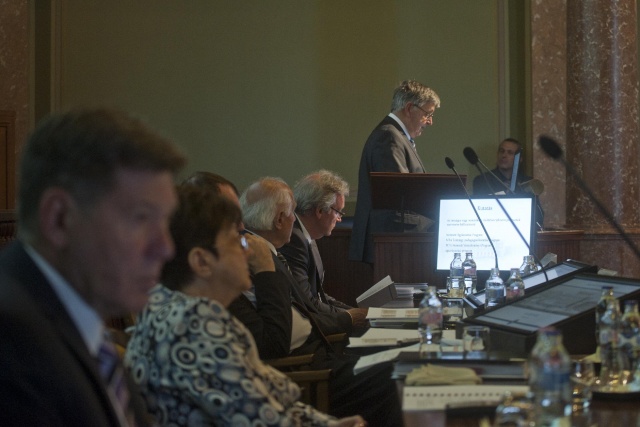 credit: mta.hu/Tamás Szigeti
credit: mta.hu/Tamás Szigeti Last year we amended the Academy’s Constitution so that the Presidium could support a small number of candidates who despite managing to gain a majority of votes in their department, did not make the allowed quota of said department. We must pay attention to female researchers, but other factors concerning the whole of the Academy should also be taken into consideration. The Academicians’ Assembly is to decide about this tomorrow.
Our next step was to set up the Committee for Women with a Scientific Career, headed by Academician Vanda Lamm. The committee presented a package of proposals to help female researchers. The most outstanding proposals are as follows: (i) the establishment of a grant to help young mothers write their MTA doctoral theses; (ii) the establishment of grants to help mothers continuing their career after maternity leave to keep up with the advancement of science; (iii) as much as possible, young mothers should be partially exempt from teaching and administrative tasks; (iv) part-time jobs and home office jobs should be available for mothers with young children as far as it promotes scientific research; (v) nursery school and kindergarten places should be available in the vicinity of universities and scientific research centres; (vi) baby-sitting should be provided during scientific conferences.
I myself would add another aspect to this issue, which calls for the examination and outlining of possible solutions. Let me give you an example. I have just presided over the finals of the MaTech competition, a nation-wide competition in mathematics and IT for secondary school students. Out of the 36 students who qualified for the finals, 35 were boys. This trend is really upsetting, as mathematics and information science are becoming more and more fundamental elements of all scientific research. The cultural and psychological aspects behind this trend should be explored at once, and we should provide possible solutions for education. I hope our Academy takes a leading role in this process.
Research
Our Academy’s main task is to promote research in our research network, at universities and everywhere else where valuable work is done. Ongoing research at MTA research institutes, supported university research groups, and Lendület ‘Momentum’ research groups are Hungary’s priceless treasures, and the experiments of our Premium postdoctoral fellows are the promise of our future. Our Secretary-General is going to give you further details about the research network and the results.
It is a well-known fact now that scientific research is teamwork – scientists from different fields, with varying knowledge and backgrounds must work together to produce results. This is even more so if we are talking about the communication of scientific results and their fair interpretation to society and decision makers, as I have already pointed out. Therefore, it is our task to explore the best forms of such cooperation.
Programmes including several institutes or national level multidisciplinary programmes are by definition similar to networks. Participants pursue research using their own expertise and their own resources, but regular meetings and internal grants help in terms of the formulation and implementation of mutual aims. Our Academy organises several of such multidisciplinary research programmes.
Excellence cooperative programmes provide a network for cooperation among research institutes, universities and industrial partners to research important topics, for both the organisation of basic and applied research programmes. These programmes may result in the preparation of expensive special devices that are used by several research groups. These programmes, which start on a small scale, can be regarded as trial runs for the potential implementation of larger national projects.
The largest national programme is the Hungarian Brain Research Programme, which is not hosted by the Academy, but by MTA KOKI (MTA Institute of Experimental Medicine) and several other academic research groups who take part in this programme. We are proud of their results, as MTA is responsible for the whole scientific community of Hungary.
The results of the first year of the Subject Pedagogy Research Programme were presented at conferences in Budapest, Pécs and Szeged in front of large and active audiences. According to foreign and domestic experts assessing the results, the work of five research groups out of the nineteen groups participating in the programme can be regarded as cutting-edge by international standards.
The National Water Programme was launched two years ago. The first detailed agenda was compiled last year, which summarises the most important water-related research topics connected to the National Water Strategy in the order of their priority. This is unquestionably a truly multidisciplinary programme, in which engineers, biologists, economists, social scientists and many others must cooperate. The research programme was prepared by the coordinating team at the MTA Centre for Ecological Research, in consultation with actors in water-related and other fields and several Hungarian and international experts, under the inspection of the Water Programme Managing Body.
The MTA Centre for Agricultural Research in Martonvásár (MTA ATK) was able to launch an Agricultural Research programme and was granted resources for major development. The new visitor centre, which is to open this year, is to present the aims and the latest results in agricultural research, using the most modern methods of science communication. The new research building and the partially reconstructed existing infrastructure will host 400 MTA ATK researchers and provide world-class equipment for scientists.
The Academy, with its large research capacity, supports important national programmes, such as Industry 4.0, Paks II or the important research projects of the car industry. Let me mention here our Targeted Momentum Programme, in which we awarded three grants last year. One of these were won by the Vehicle Acoustics Research Group of Széchenyi István University, Győr and Audi Hungaria. As a result of this grant, the whole of Audi’s vehicle acoustics research is to move to Hungary.
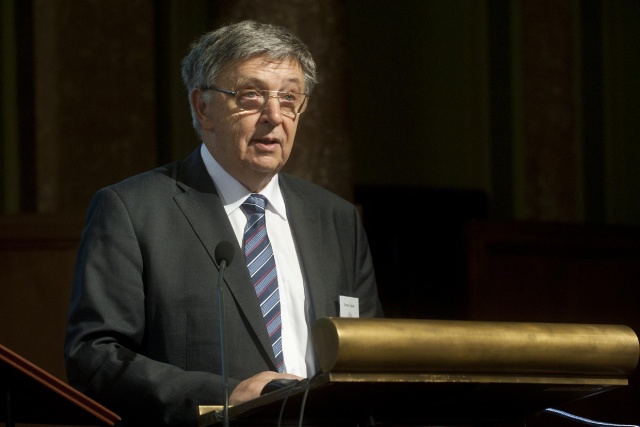 László Lovász credit: mta.hu/Tamás Szigeti
László Lovász credit: mta.hu/Tamás Szigeti Finally, let me mention two topics that are useful for the general public, about which the Academy tries to advocate a scientific point of view at conferences and their proceedings.
In December 2017, the World Economy Scientific Council was established with the coordination of the MTA Research Centre for Economic and Regional Studies. To be more precise, it was re-established on the initiative of our Secretary-General – as a similar organisation operating between the 1970s and 1990s. The Council analyses the fundamental processes of the world economy, and thus helps us to explore and understand the most important global economic trends. The council also regularly publishes articles on topics discussed at their meetings, and each year it publishes a collection of essays.
The Presidential Committee for Health, headed by Department President György Kosztolányi, is organising a series of conferences that can be rightly called a health care programme. Based on international trends and examples, with a reliance on economic, legal, and sociological points of view, and the taking of the development of information technology, science and technology into consideration, these conferences compile reports that will serve as a basis for the reformation of our health care system.
Our relationship with the Government
It was approximately a year ago that the ambitious but real long-term aim of our cooperation with the government was set: Let Hungary be the scientific centre of the region! This sentence was the motto of our report submitted to the Parliament. Owing to our traditions, scientific diplomacy efforts, and leading researchers establishing new schools of thought, Hungary excels in science relative to its number of inhabitants. In order to become a real scientific centre, a lot of effort is needed – from the Academy and the community of scientists and politicians, as well. Several steps are to be taken in this direction, including the reconstruction of the main building of the Academy, the construction of a new conference centre, the improvement of the situation of research universities, and through making Hungary more attractive for foreign scientists by both improving the financial conditions and by reducing administrative burdens. We must also strengthen our international relationships, which I will get back to later.
Turning to our daily relationships, the National Research, Development and Innovation Office and the Ministry of Human Capacities (EMMI) have been our most important partners in the past years. We have consulted both institutions on a regular basis, as we have several mutual aims.
Two years ago, we signed a cooperation contract with EMMI, in which we outlined our roles in higher education, summarised the topics and methods of our joint research, and determined the shared needs for infrastructural development and other common issues. I am very happy to see that important steps have been taken in line with this agreement. In the National Excellence Programme, EMMI has established the “Bolyai+” Grant, complementing the already existing Bolyai János Research Grant. We are in the process of negotiating regarding extra support for our university research groups and the provision of additional support for the excellence programmes mentioned above. It seems the issue of the integration of university Momentum Research Groups is to be resolved.
It is natural that EMMI is also interested in our Subject Pedagogy Research Programme. We hope that those research groups that have more practical aims, such as the development of subjects, are to be funded with minimal delay. We continue to undertake the task of assessing and providing counselling regarding the National Core Curriculum, with the help of our community of experts. The Academy cannot play a bigger role in short-term decisions concerning public education, as we do not have the capacities for developing teaching materials.
Let me mention still another problem that we are trying to solve together with EMMI. Unfortunately, fewer and fewer young people are interested in working as researchers or university teachers. This is a trend witnessed world-wide. In Hungary, there is an extra problem: the most talented young people are leaving the country for their higher education, due to which they will have absolutely no contact with the Hungarian scientific community. EMMI is trying to devise a grant that could partly counterbalance the attraction of Cambridge and Oxford. The Academy has an important role here. It is indispensable that young students can meet science and scientists during their basic education. Our institutes, university departments and research groups should show schoolchildren the beauty of research and what high-level research centres we have and what exciting problems we solve.
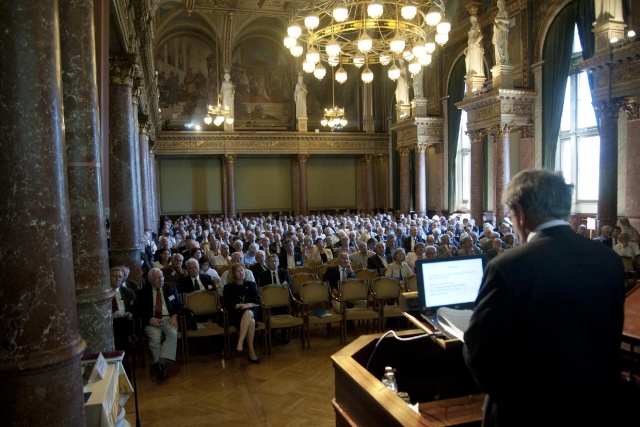 credit: mta.hu/Tamás Szigeti
credit: mta.hu/Tamás Szigeti I will only speak about our cooperation with other ministries briefly, although very important projects are running. We regularly consult the Ministry of Interior (Water Programme, development of information technology infrastructure), the Ministry of Agriculture (Agricultural Reearch Programme, Water Programme), and we continuously consult partners regarding the field of energetics.
Our international relationships
It is of vital importance for a small and open country like Hungary to take part in international scientific life. We have several long-lasting contacts, which I shall only mention in a few words, despite their importance. These include the cooperation of the V4 academies and their annual meeting. Although we have managed to take a step forward, we still have a lot to do in ensuring better circumstances for the Horizon 2020 Programme. We have already started to prepare for the next Framework Programme, FP9. We really hope that it will be possible to change the conditions that are not favourable for us. In our region, Hungary and the scientific community of the Academy is still extraordinarily successful in winning grants from the European Research Council (ERC). There is also a promising correlation between excellence in ERC Grants and Momentum Grants. However, to keep up this successful trend, we must work hard in the future.
I wish to mention two outstanding international events from the past year. ALLEA, the European Federation of Academies of Sciences and Humanities, and Academia Europaea, which serves as the European Academy of Sciences, held their annual meeting and general assembly jointly in Budapest in September 2017 for the first time. Several other organisations joined the four-day-long programme, including the Young Academy of Europe, the European Research Council and SAPEA (Science Advice for Policy by European Academies), which is a European academic consortium supporting the scientific advisory board of the European Council. The Hungarian Academy of Sciences, as organiser and host, helped in bringing together approximately 300 high-level European scientists and scientific decision makers.
The 8th meeting of the World Science Forum was held in Jordan, on the shore of the Dead Sea, in November 2017. This ever-growing conference was initiated by our Academy, and its main host has always been MTA. The motto of the conference was “Science for Peace”, and Her Royal Highness Princess Sumaya bint El Hassan, President of the Royal Scientific Society of Jordan, and myself were the chairs of the conference. Abdullah II, King of Jordan, and János Áder, President of Hungary, also took part in the conference. Mr Áder also delivered a speech at the opening ceremony of the World Science Forum, and handed over a state decoration to Princess Sumaya.
Last year’s Word Science Forum was an important political event. We wish to select themes for the next meeting, the ninth one, in Budapest, which more directly affect scientists and, thus, interests the community of researchers more. It is important that this forum should convey a message not only for science policy makers and decision makers, but also to increase trust in science all over the world. Therefore, I wish to set the focus of the 2019 World Science Forum on the ethics of science and moral questions that are inseparable from scientific research, and the responsibility which goes with using scientific results. I ask the Academy’s regular members and the members of our public body to support this initiative.
Communicating and popularising science
We meet several alarming phenomena that all emphasise the importance of popularising science and of communicating the latest scientific results: pseudosciences and quackery are spreading; a loss of interest in the sciences on the part of students; innovation is not fast enough; and a work force shortage in scientific fields and fields where technological knowledge is required. In the past years, the Academy has worked hard to increase the effectiveness of popular science communication and arouse young people’s interest in science through more and more channels. I was happy to see that our departments have undertaken the task of communicating results to the wider public.
Now I shall only briefly mention our communication methods that I spoke about in previous years, although each one would deserve much more attention.
The Hungarian Science Festival, headed by our Deputy Secretary-General, attracted thousands of people. The programme included more than two-hundred events, and we published several hundred news pieces to share the latest results in science with the wider public. Our Science and Parliament forum offered opportunities for key players in politics and economy to talk to each other. We also have ambitious plans for our programme, scheduled for this year, with the motto Science Without Borders.
Our journal, Magyar Tudomány (Hungarian Science), carefully edited by Academician András Falus, has been published by the prestigious Akadémiai Kiadó since 2017. We hope more and more people will read its interesting articles.
Our regularly updated homepage focuses on the latest exciting scientific results, which is accompanied by a less formal Facebook page. It is worth visiting on a daily basis. We have also launched a new interview series online in Hungarian entitled Utak a Széchenyi térre (Roads to Széchenyi Square), which focuses on academicians’ life paths. Another important forum for the popularising of the latest scientific results is our weekly half-an-hour-long broadcast Szigma (Sigma) on InfoRadio.
These information dissemination possibilities can only be utilised with the active help of our fellow scientists. I call the scientists working at research institutes, university departments and other research centres to publish their new, outstanding results in a form understandable to the general public on the platforms offered by MTA.
These include the freshly launched homepage tudomany.hu, edited by István Fábián. The main objective of the homepage is to fight pseudoscience by presenting scientific methods connected to the hot topics of pseudoscience in a form that is understandable to the wider public. We recommend this homepage to teachers, journalists and all those interested. The homepage focuses on a new topic each month, the first being the importance of vaccination. They aim to help readers tell scientific and pseudoscientific news pieces apart. Let me quote the editor here: “We hope this homepage will contribute to the popularisation of real science and the acceptance of scientific results by the wider public. We hope it will serve as a source of information in this chaotic ‘beyond facts’ world, and as a homepage that is known and cited by journalists, editors, teachers, students and thinking people in general.”
In conclusion
The Academy’s primary task is to support scientific research, including basic research and applied research in the search for solutions to scientific, social and technological challenges. These two types of research are inseparable, not only because, for example, the most exciting technological innovations are always based on scientific results, but also because young generations meet new theories, methods and techniques through participation in basic research, and their knowledge is indispensable for successful innovation if they later start working in industry or other fields.
Likewise, we cannot separate Hungarian and international scientific life from each other either. We should also be a part of the international scientific thought community and should develop scientific instruments for the world’s scientists. I was very happy to participate in the closing conference of two of our scientific programmes last year. The lectures, delivered by three Nobel laureate lecturers at each of these conferences, showed that prestigious scientific events take place here. Let us work together to ensure that such noble events can demonstrate the power of Hungarian science.
